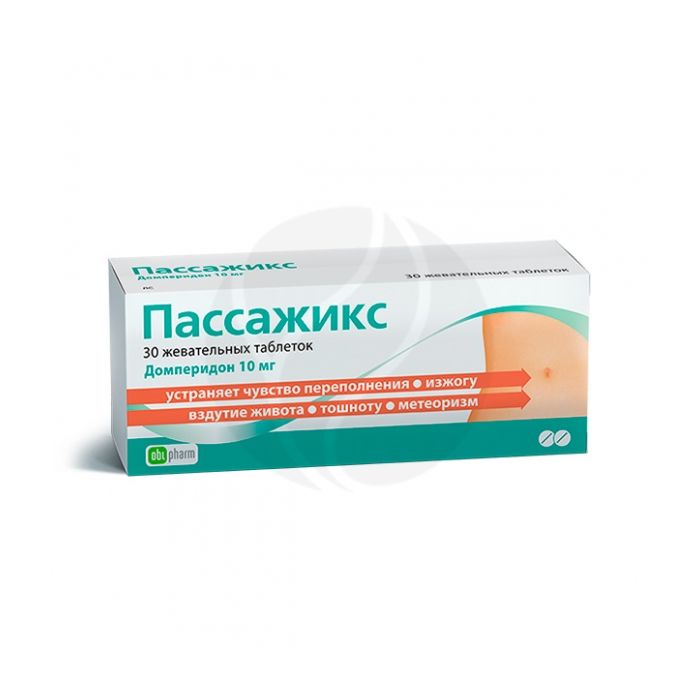Passage chewable tablets 10mg, No. 30
Expiration Date: 05/2027
Russian Pharmacy name:
Пассажикс таблетки жевательные 10мг, №30
vomiting and nausea of ??various origins (including against the background of functional and organic diseases, infections, with toxemia, radiation therapy, diet disorders; drug genesis - taking morphine, apomorphine, levodopa and bromocriptine; during endoscopic and radiopaque (the need to accelerate peristalsis ) studies of the gastrointestinal tract; hiccups, gastrointestinal atony (including postoperative).
dyspeptic disorders against the background of delayed gastric emptying, gastroesophageal reflux and esophagitis (feeling of fullness in the epigastrium, feeling of bloating, flatulence, gastralgia, heartburn, belching with or without throwing gastric contents into the oral cavity).
Inside, before meals for 10-15 minutes.
Chronic dyspepsia: adults - 10 mg (1 tab.) 3 times a day, 15-30 minutes before meals and, if necessary, before bedtime; children over 5 years old - 2.5 mg (1/4 table) per 10 kg 3 times a day before meals and, if necessary, before bedtime.
Acute and subacute conditions (primarily nausea and vomiting): adults - 20 mg (2 tablets) 3-4 times a day before meals and before bedtime; children over 5 years old - 5 mg (1/2 table) per 10 kg 3-4 times a day before meals and before bedtime.
For patients with renal insufficiency, dose adjustment is necessary, the frequency of administration should not exceed 1-2 times during the day.
The maximum daily dose for adults is 80 mg (table 8). The maximum daily dose for children should not exceed 10 mg (1 tablet chewable) per 10 kg.
| Chewable tablets | 1 tab. |
| active substance: | |
| domperidone | 10 mg |
| excipients: aspartame; lactitol; xylitol; magnesium stearate; menthol |
established intolerance to the drug and its components;
prolactin-secreting pituitary tumor (prolactinoma);
phenylketonuria;
children under 5 years of age and children weighing up to 20 kg.
Passage should not be used when stimulation of the motor function of the stomach can be dangerous, incl. with gastrointestinal bleeding, mechanical obstruction or perforation.
With care: renal / hepatic failure, lactation, pregnancy.

